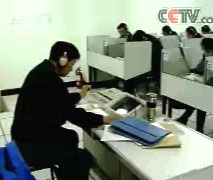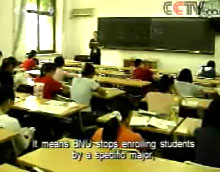 Some Colleges and Universities around China have announced a new recruitment policy this year giving priority to high school graduates whose parents are medical workers in the forefront of the battle against SARS. Some Colleges and Universities around China have announced a new recruitment policy this year giving priority to high school graduates whose parents are medical workers in the forefront of the battle against SARS.
SARS may have disrupted all aspects of life in China, but the annual college entrance examinations are still being held as scheduled, starting on the 7th of June. Since the outbreak of SARS, many have felt grateful and touched by the hard work and selflessness of the hundreds of thousands of medical workers fighting day and night in the forefront of the battle against this deadly disease. Some have even lost their lives while trying to save the lives of others. Aid and support comes in different ways. This year, many universities and colleges have decided to give priority to the children of these medical workers in their recruitment policy.
It is the responsibility of each and every person in China to fight against SARS. Hundreds of thousands of medical workers have chosen to stay at the bedside of SARS patients instead of supporting their children while they sit the college entrance exams. These examinations are a very important event that decides the future path for many of China’s young people. Universities and colleges have felt a responsibility to offer their own kind of support to medical workers. Beijing Normal University, Beijing University, Tianjin University and other elite colleges in China have announced that they will give priority in their admission policy to high school graduates whose parents are medical workers at the forefront of the battle against SARS.
“After careful consideration and discussion, we finally came to a decision: to give priority to the children of medical workers at the forefront of the battle against SARS. First, priority will be given to students whose parents are medical workers who have died in the battle against SARS. As long as these students’ core marks reach the level required by key universities and BNU is their first choice, we will accept them. Secondly, students whose parents have won provincial awards for their contribution in the battle against SARS, and BNU is their first choice, even if their score is 20 points below the cut off line, they can be admitted to the university. Finally, those students whose parents are involved in the battle against SARS, whose first choice is BNU, and scores reach the cut off line will be given priority for admission,” said Li Zihua, director of Admission Office at Beijing Normal University.
The SARS epidemic has also made people cautious and changed the admissions process itself. In the past colleges and universities would send workers all over the country to interview and enroll students. According to Wang Xudong, director of admissions at Beijing Language and Culture University, this year the admissions process will be completed entirely through computer networks. This will mean a dramatic reduction in direct physical contact between people, increase efficiency and more importantly, greater transparency, because all information related to admitted students including their scores and files will be published on the network. And this information will accessible to the public.
“The college entrance exam has been brought forward by one month. So admissions work will also be advanced by a month. This year, the entire admissions process will be completed through the computer network. We are now focusing on technical preparations. We have been rehearsing the process on computers with provincial admissions offices all over the country. Technically, we are well-prepared. Admissions work will begin in early July,” said Wang Xudong, director of Admission Office at Beijing Language and Culture University.
BLCU is the only top university in China that focuses on the teaching of Chinese language and culture for non-Chinese speakers. It has around 7,000 overseas students and more than 2,000 Chinese students studying on campus. Because of SARS, most foreign students have returned to their home countries.
This year, BLCU has seen a drop in applications from overseas students due to the impact of the epidemic. Accordingly, it has adjusted its admission policy by accepting about 60 more Chinese students. Originally, it had planned to enroll 600 high school graduates from around the country. The extra number is small, but it is good news for the lucky students and their parents.
 In China, students are required to choose between studying history and literature or science at senior high school. Some argue that it is not fair to force teenagers to narrow down their studies at such an early age. The interest a student has in a specific area of study may change in the future. At the forefront of education reform is Beijing Normal University which has designed a series of education formats for students.
In China, students are required to choose between studying history and literature or science at senior high school. Some argue that it is not fair to force teenagers to narrow down their studies at such an early age. The interest a student has in a specific area of study may change in the future. At the forefront of education reform is Beijing Normal University which has designed a series of education formats for students.
According to Li Zihua, director of Admission Office at Beijing Normal University, BNU has adopted an ‘open style admission’ method since 2000. It means that students no longer apply for a specific major. Instead they apply to a department or school. BNU has 52 majors. Only 38 are published on the admissions list. One school publicizes one major. The School of Education, for instance, has four majors: education, public affairs management, special education, and pre-school education. Admission is actually done by the School of Education. Students only need to apply for admission to that school. In the first two years, students study fundamental courses together. By the end of the second year, they can choose courses according to their own individual interests. If one person likes education they can develop in that direction. Many female students are interested in children’s education, so do some male students nowadays. If they decide to work in a kindergarten in the future, they can choose to major in young children’s education. BNU gives students the right of choice in determining their studies and future careers. It’s much better than limiting a young student’s major in the first academic year.
That’s not the end. BNU has long switched from the conventional education model. Its new model is based on one principal that is offering students more than one choice in the development of their future careers.
|